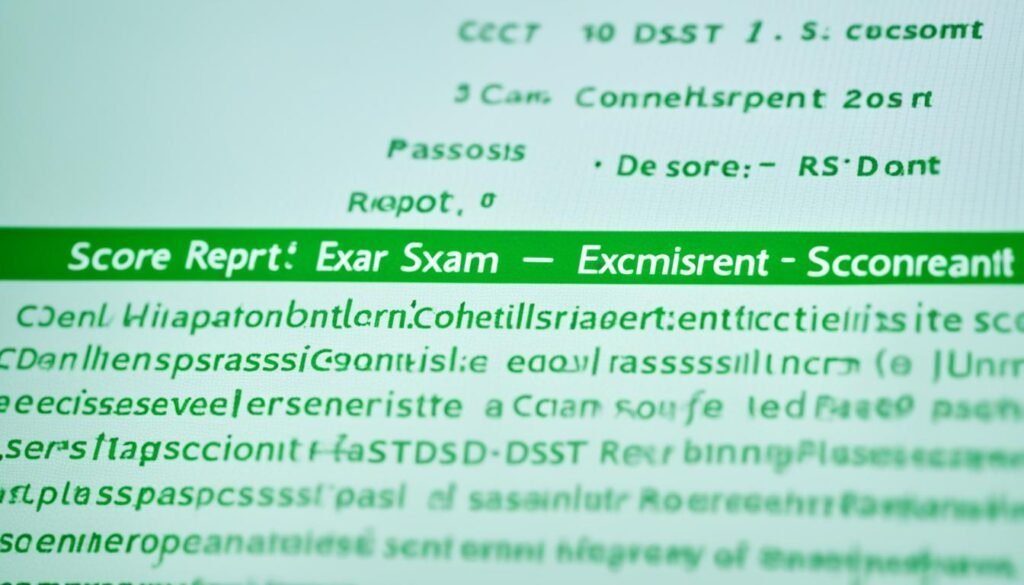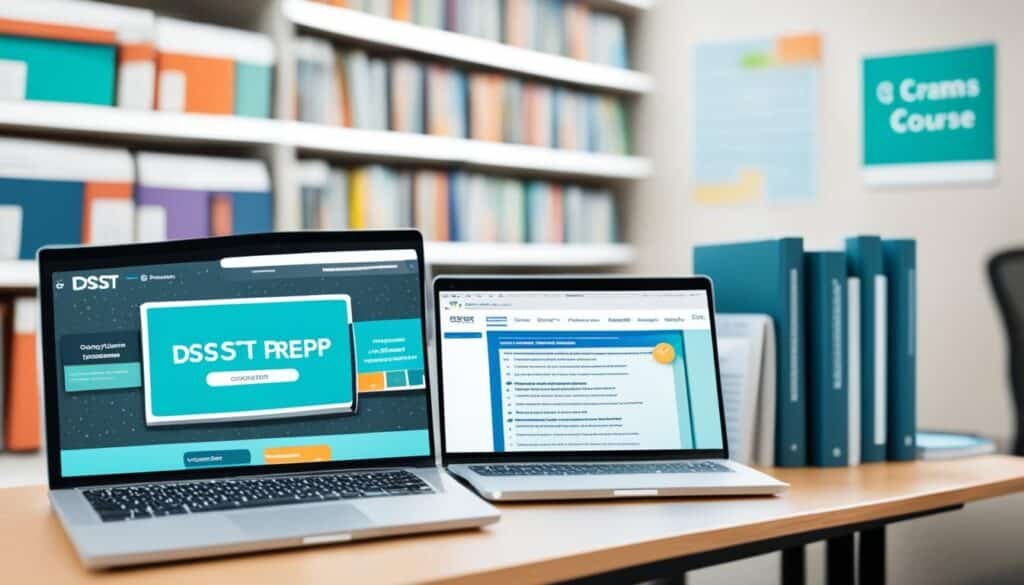The DSST (DANTES Subject Standardized Tests) exams are an affordable and comprehensive way to earn college credits outside of the traditional classroom setting. These exams, recommended for college credit by the American Council on Education, cover a wide range of subjects, from business and social sciences to mathematics and humanities. By passing DSST exams, students can save time and money on their path to a college degree. The DSST program is funded by DANTES (Defense Activity for Non-Traditional Education Support) and is an approved VA national testing program, making it an attractive option for military personnel and veterans. This article will provide a detailed overview of DSST exams, including the benefits, subjects covered, preparation strategies, testing centers, scoring, and how DSST credits can be applied towards a college degree.
Key Takeaways : DSST Exams
- DSST exams are an affordable and flexible way to earn college credits outside the traditional classroom.
- These exams are recommended for college credit by the American Council on Education and cover a variety of subjects.
- The DSST program is funded by DANTES and is an approved VA national testing program, making it accessible to military personnel and veterans.
- Passing DSST exams can help students save time and money on their path to a college degree.
- This article will provide a comprehensive overview of DSST exams, including preparation strategies and how to apply DSST credits towards a degree.
Understanding DSST Exams
DSST Exams, also known as DANTES Subject Standardized Tests, are a form of credit-by-exam that allows students to earn college credits by demonstrating their knowledge in a wide range of subjects. These exams are recommended for college credit by the American Council on Education’s College Credit Recommendation Service (ACE CREDIT), making them a valuable option for those seeking to accelerate their path to a degree.
What are DSST Exams?
DSST exams are standardized tests that cover a variety of academic disciplines, from business and social sciences to mathematics and humanities. Developed and administered by DANTES (Defense Activity for Non-Traditional Education Support), these exams are designed to evaluate a student’s proficiency in a specific subject area, allowing them to earn college credits without the need for traditional classroom instruction.
Benefits of Taking DSST Exams
By passing DSST exams, students can save time and money on their path to a college degree. These exams are an approved VA national testing program, funded by DANTES, making them a particularly attractive option for military personnel and veterans who are eligible to take them. Additionally, the DSST program offers a wide variety of subjects for students to choose from, allowing them to earn credits in areas that align with their academic and career goals.
Subjects Covered by DSST Exams
The DSST program currently offers over 30 exam titles across a diverse range of subjects, including:
- Business
- Social Sciences
- Mathematics
- Humanities
- Natural Sciences
- Technology
Whether you’re interested in business finance, psychology, or computer science, the DSST program likely has an exam that can help you earn college credit and accelerate your academic journey.
Choosing the Right DSST Exam

When selecting a DSST exam, it’s crucial to carefully assess your prior knowledge and skills in the subject matter. This will help you determine which exam is the best fit for your current level of understanding. For example, if you have a strong background in business or accounting, you may consider taking the DSST Principles of Finance or DSST Money and Banking exam.
Assess Your Prior Knowledge
Before registering for a DSST exam, take the time to reflect on your existing knowledge and expertise in the subject area. This self-assessment will not only help you choose the appropriate exam but also guide your preparation strategy. Consider the coursework you’ve completed, any relevant work experience, or independent study you’ve undertaken in the past.
Consult Your Academic Advisor
Discussing your DSST exam plans with your academic advisor can provide valuable guidance. They can offer insights into institutional policies, credit transfer procedures, and the best way to incorporate DSST credits into your degree program. Your advisor may also be able to suggest specific DSST exams that align with your academic and career goals.
DSST Exams Preparation Strategies

Preparing effectively for DSST exams requires a strategic approach that includes creating a study plan, utilizing practice tests, and developing time management skills. By employing these preparation strategies, students can optimize their chances of success and maximize the benefits of the DSST program.
Create a Study Plan
Developing a comprehensive study plan is crucial for DSST exam preparation. Begin by assessing your current knowledge of the subject matter and identifying any gaps or areas that require more attention. Create a schedule that allocates dedicated time for reviewing course materials, practicing sample questions, and simulating the testing environment.
Utilize Practice Tests
Incorporating practice tests into your preparation is an invaluable strategy for DSST exams. These practice tests allow you to familiarize yourself with the exam format, question types, and time constraints, helping you develop the necessary skills and confidence for the actual test. Utilize official DSST practice materials, as well as resources from third-party test prep providers, to ensure a well-rounded preparation experience.
Time Management During the Exam
Effective time management is crucial during the DSST exam. Develop strategies to pace yourself, such as allocating time for each section or question type. This will help you avoid rushing through the exam and ensure that you have sufficient time to thoroughly consider and respond to all questions. Additionally, familiarize yourself with the testing environment and any specific instructions or regulations to minimize surprises on test day.
DSST Exams Testing Centers

To take a DSST exam, you’ll need to find a nearby Prometric testing center. Prometric is the authorized test administrator for DSST exams, with testing locations spread across the United States. The DSST’s institution search tool makes it easy to locate the closest Prometric testing center to your location.
Locating a Testing Center
Simply visit the DSST website and use the institution search tool to find a Prometric testing center in your area. You can enter your zip code or city and state to see a list of available testing centers, along with their addresses and contact information. This will allow you to choose the most convenient location for taking your DSST exam.
Test Day Requirements
When you arrive at the Prometric testing center, be sure to bring a valid government-issued photo ID, such as a driver’s license or passport. You’ll also need to follow the test day procedures and policies set forth by Prometric, which may include providing personal information, securing your belongings, and adhering to the testing environment’s rules and regulations. It’s a good idea to familiarize yourself with the Prometric test day requirements in advance to ensure a smooth and stress-free testing experience.
Scoring and Receiving Results

After completing your DSST exam, your scores will be reported to both you and the institution you have designated. The scoring scale for DSST exams ranges from 200 to 500, with a passing score typically set at 400 or higher.
To receive your DSST exam results, you can access your transcript through the DSST program’s official website or by contacting the test center where you took the exam. This transcript will detail your score and indicate whether you have successfully passed the exam.
If you achieve a passing score, the credits earned can be applied towards your college degree, depending on the policies and requirements of your academic institution. It’s important to work closely with your academic advisor to ensure a seamless transfer of your DSST credits.
| DSST Exam Scoring Scale | Passing Score |
|---|---|
| 200 to 500 | 400 or higher |
Cost and Funding Options
Taking a DSST exam can be an affordable pathway to earning college credits, with an average exam fee of approximately $85. This fee covers the administration and scoring of the exam, making it a cost-effective option for students seeking to maximize their time and money.
Exam Fees
The dsst exam fees can vary slightly depending on the specific exam and the testing center location, but the standard cost is typically around $85 per exam. This fee is generally lower than the cost of taking a traditional college course, providing students with a more budget-friendly alternative for earning college credits.
Funding for Military Personnel
One of the key advantages of the DSST program is its accessibility for military personnel and veterans. The DSST exams are an approved VA national testing program, and the costs can often be covered or subsidized through various educational benefits and funding sources available to military personnel and veterans. This makes the DSST exams an attractive option for those serving or who have served in the armed forces.
DSST Exams and College Credit

One of the primary benefits of DSST exams is the ability to earn college credits that can be applied towards a degree program. However, the process of transferring DSST credits can vary depending on the policies and requirements of your academic institution.
Transferring Credits
When it comes to transferring DSST exam credits, the key is to work closely with your academic advisor. They can provide guidance on which DSST exams are accepted by your college or university, as well as the specific requirements for applying those credits towards your degree program. The number of credits awarded for each DSST exam can also vary, so it’s important to understand the policies of your institution.
Institutional Policies
Different colleges and universities may have diverse policies regarding the acceptance and application of DSST exam credits. Some institutions may have a strict limit on the number of DSST credits they will accept, while others may be more flexible. It’s crucial to research the institutional policies at your chosen school to ensure that the DSST credits you’ve earned can be successfully transferred and applied towards your degree requirements.
DSST Exams vs. Other Credit-by-Exam Options

In addition to DSST exams, students have other credit-by-exam options available, such as CLEP (College-Level Examination Program) and AP (Advanced Placement) exams. While these programs share the common goal of allowing students to earn college credits through standardized testing, there are some key differences to consider.
CLEP Exams
CLEP exams are designed to assess a student’s knowledge and understanding of college-level material, offering the opportunity to earn credits without taking the corresponding course. Similar to DSST exams, CLEP exams cover a wide range of subjects, from humanities and social sciences to business and science. One advantage of CLEP exams is their broad acceptance, as they are recognized by over 2,900 colleges and universities across the United States.
AP Exams
AP (Advanced Placement) exams are another credit-by-exam option, typically taken by high school students to earn college credits. These exams are administered by the College Board and cover a more advanced and specialized curriculum compared to DSST and CLEP exams. AP exams are primarily taken by students who have completed rigorous high school coursework and are seeking to demonstrate their mastery of the subject matter.
While DSST, CLEP, and AP exams all provide students with the opportunity to earn college credits through standardized testing, the specific requirements, subject coverage, and acceptance policies can vary. It is essential for students to research and compare these credit-by-exam options to determine the best fit for their academic goals and institutional requirements.
Success Stories and Testimonials

While this article has provided a comprehensive overview of DSST exams, the true testament to their value lies in the success stories and testimonials of students who have leveraged this program to achieve their educational and career goals. These dsst exam success stories and testimonials serve as a powerful reminder of the transformative impact the DSST program can have on individuals’ lives.
Take the story of Sarah, a working mother who was able to earn her bachelor’s degree in just three years by passing several DSST exams. “The DSST program allowed me to get the college credits I needed without spending years in a traditional classroom setting,” Sarah shares. “I was able to apply my prior knowledge and experience towards my degree, saving me both time and money.”
Similarly, military veteran Michael credits the DSST exams for helping him transition smoothly into civilian life after his service. “As a member of the armed forces, the DSST program was an approved VA national testing program, making it an accessible and affordable option for me to earn college credits. The variety of subjects covered by the DSST exams meant I could demonstrate my knowledge in areas beyond my military training.”
These dsst exam success stories and testimonials highlight the transformative power of the DSST program, empowering students from diverse backgrounds to unlock their full potential and achieve their educational goals. By leveraging their prior knowledge and skills, these individuals were able to save time and money on their path to a college degree, ultimately setting themselves up for long-term success.
Online Resources and Test Prep Materials

Preparing for DSST exams can be made easier with the abundance of online resources and test preparation materials available from both official and third-party providers. These tools can help you familiarize yourself with the exam format, content, and strategies for success.
Official DSST Resources
The DSST program offers a wealth of resources on their website, including detailed information about each exam, sample questions, and study guides. Additionally, the Prometric website, which administers the DSST exams, provides test-takers with important information about registering, scheduling, and taking the exams.
Third-Party Test Prep Providers
In addition to the official resources, there are several third-party providers that offer comprehensive DSST test prep materials. Some popular options include Peterson’s, DSSTPREP, and EBSCO LearningExpress, which offer practice exams, study guides, and online courses to help you prepare for your DSST exams.
By utilizing a combination of official and third-party DSST exam resources, you can create a well-rounded study plan that addresses your specific learning needs and increases your chances of success on the exams.
DSST Exams

Available Exam Titles
The DSST program currently offers over 30 exam titles across a diverse range of subjects, providing students with a wealth of options to earn college credits. From business and social sciences to the humanities and mathematics, the DSST exam titles cover a wide spectrum of academic disciplines, catering to the varied interests and educational goals of students.
Exam Content and Scope
Each DSST exam content and exam subjects are designed to assess a student’s knowledge and understanding of a specific subject matter. The exams are structured to cover the essential concepts, theories, and principles that are typically taught in college-level courses. By passing these exams, students can demonstrate their expertise and earn credits that can be applied towards their degree program.
| DSST Exam Title | Exam Content |
|---|---|
| Principles of Supervision | This exam evaluates a student’s understanding of the fundamental principles and practices of effective supervision, including leadership, communication, and employee development. |
| Criminal Justice | The Criminal Justice DSST exam assesses a student’s knowledge of the American criminal justice system, covering topics such as law enforcement, the courts, and corrections. |
| Principles of Public Speaking | This exam tests a student’s ability to apply the principles and techniques of effective public speaking, including audience analysis, message development, and delivery. |
By thoroughly understanding the dsst exam titles, dsst exam content, and dsst exam subjects offered, students can strategically select the exams that align with their academic interests and career aspirations, maximizing the benefits of the DSST program.
The DSST exam encompasses diverse topics such as risk and return, embryonic stem-cell research, approaches to religion, purposes of speeches, real number systems, sets and logic, conversions and geometry, graphs and functions, exponents and logarithms, determining astronomical distances, internal earth processes, anthropology, new economic policy, World War II, reform and collapse, and environmental impacts.
Also Read: CTC Exams Prep: Your Pathway To Teaching Certification
Conclusion
In conclusion, DSST exams offer a cost-effective and flexible way for students to earn college credits and accelerate their path to a degree. By leveraging their prior knowledge and skills, students can bypass traditional coursework and focus on more specialized or advanced classes, saving both time and money in the process. With a wide range of subject areas covered, DSST exams provide an opportunity for students to demonstrate their academic proficiency and earn credits that can be applied towards their chosen degree program.
Proper preparation is the key to success on DSST exams. By creating a study plan, utilizing practice tests, and developing effective time management skills, students can increase their chances of passing these exams and achieving their educational goals. Additionally, the availability of various online resources and test preparation materials can further support students in their DSST exam journey.
Overall, the DSST program offers a valuable alternative to traditional classroom learning, allowing students to save both time and money while still earning the credits they need to succeed. Whether you’re a military member, a working professional, or a traditional college student, DSST exams can be a powerful tool in your academic and career development toolkit.
FAQs
Q: What are DSST exams?
A: DSST exams, also known as Dantes Subject Standardized Tests, are a series of exams designed to test a candidate’s knowledge in various subjects for college credit.
Q: Where can I find the DSST exam list?
A: You can find the DSST exam list on the official DSST website or by browsing our 30 available DSST exam options.
Q: Who is eligible to take DSST exams?
A: Eligible candidates for DSST exams include military personnel, veterans, and civilians who are looking to earn college credit through prior learning assessment.
Q: Is DSST an approved option for veterans using VA benefits?
A: Yes, DSST is an approved option for veterans using VA benefits to earn college credit through their prior knowledge and experience.
Q: What topics are covered in DSST exams related to business?
A: DSST exams cover a wide range of topics related to business, including cost of capital, regulation of business, ethics of information, corporations and stakeholders, and business and government.
Q: Can DSST exams help with credit for solving quadratic inequalities and operations of functions?
A: Yes, DSST exams can provide college credit for topics such as solving quadratic inequalities, operations of functions, business decision making, kinds of money, and the federal reserve system.
Q: What are some other subjects that DSST exams cover?
A: In addition to business-related topics, DSST exams also cover subjects like international monetary system, data collection methods, discounts and markups, distribution of ownership, development life cycles, working capital management, and valuation and characteristics.
Source Links
- https://blog.tesu.edu/how-to-prepare-for-a-dsst-exam-in-8-easy-steps
- https://getcollegecredit.com/prepare-for-a-test/
- https://www.dssttestprep.com/post/top-5-test-tips-for-preparing-for-your-dsst-exam





